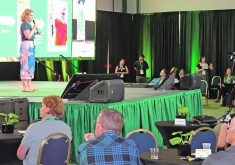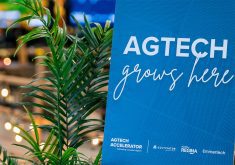Cultivator powered by Conexus is looking for the next round of participants for its AgTech Accelerator program
The AgTech Accelerator program by Cultivator powered by Conexus, which is designed to support inventive people in agriculture, is looking for 15 people to fill Cohort 4.
“When we say ag tech, we’re talking about the use of technology in agriculture or horticulture, with the aim of improving yield, efficiency and or profitability,” said Laura Mock, director of Cultivator.
“So, agriculture technology can be products, services or applications used in agriculture that improve various inputs or outputs. And it could be new technology used in agriculture, or it could be existing technology with new applications in agriculture.”
Read Also

House ag committee to undertake several studies
The House of Commons standing agriculture committee has set its agenda for the coming months. Members began the fall sitting with a two-hour update on international trade
Cultivator was started in 2021 and has had one cohort per year. A limited number of spots is aimed to ensure continuation of the “curated connections” and one-on-one support, with enough diversity of thinking for founders to support each other as well.
Mock says this kind of interaction “diminishes once you get too big.”
Each cohort period is three months long to fit in the farming cycle. She said this is to ensure the availability and involvement of producers and the agriculture industry, with kickoff in April and the finale in July.
For 2025, the finale will take place at the Ag in Motion farm show near Langham, Sask., for the first time in order to build stronger connections between the tech innovators and the farmers who will use the technology.
Mock said it’s hoped Ag in Motion can more prominently showcase the program and form relationships among industry leaders and company founders.
“Moving to Ag in Motion is a massive lift. I cannot underscore that enough. It is not just, ‘we’ve done it here, now we’re going to do it there.’ It is completely different.”
The program is open to company founders across Canada. Canadian founders come first in the Cultivator program because it wants to ensure any program growth is tangible for those at home before expanding internationally.
However, international partnerships are also a priority, and Mock says there are already strong partnerships with some companies in the United Kingdom.
Cultivator has also been in talks with groups from Australia, Brazil and Norway. Monk says it’s all about building connections with the hope of getting the tech into the different markets and sharing experiences.
“We’ve been having very active conversations with AgriFutures Australia,” Mock says.
“A lot of interest to get their founders into our program and into Saskatchewan, meeting with producers. And a lot of interest from the producers we support to kind of have a soft landing in Australia, to sort of feel out that marketplace.”
The third priority is technology adoption, which is a growing challenge.
Monk says Cultivator has noticed that producers have been slow to adopt technology, but not because they don’t want it. They identify new tech as a potential risk to their operation and a disruption of their farming cycles that could lose them profits and their livelihood if something goes wrong.
Cultivator is also focusing on the right ways to implement new tech.
One way it did that was by doing a lot of groundwork at Ag in Motion in 2024 to see what producers were looking for. It spoke to many producers, and the overwhelming response was that they wanted to speak with founders one on one and have the ability to try out the tech.
It’s expected that each company in the cohort should have a working prototype at Ag in Motion. The goal of that is to get feedback to help shape product development and innovation.
“Just because the founders have working prototypes and examples, it doesn’t mean that the product is developed. It is still being improved.”
The AgTech Accelerator program currently has more of a crop focus when selecting applicants. Mock says picking founders from the same areas helps improve collaboration.
However, Cultivator is also exploring an expansion to livestock ag tech and a global commercialization program.
In 2025, it will build out a formal and structured alumni support program to engage founders past their cohort “time limit.” It hopes to create a connection between past cohorts and current ones to provide greater support and a sharing of experiences.
Mock welcomes all to apply before Jan. 2, no matter the stage of their innovation. The application process will include standard business questions regarding such areas as product, revenue model and licensing.
“We kind of want to know where they are in terms of their business,” she said.
“That there is a proven desire for customers to have a problem solved, and that there’s a willingness to pay.”


















